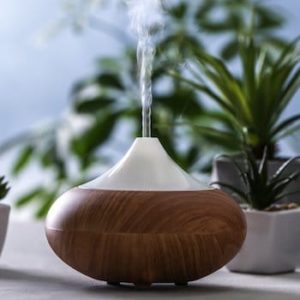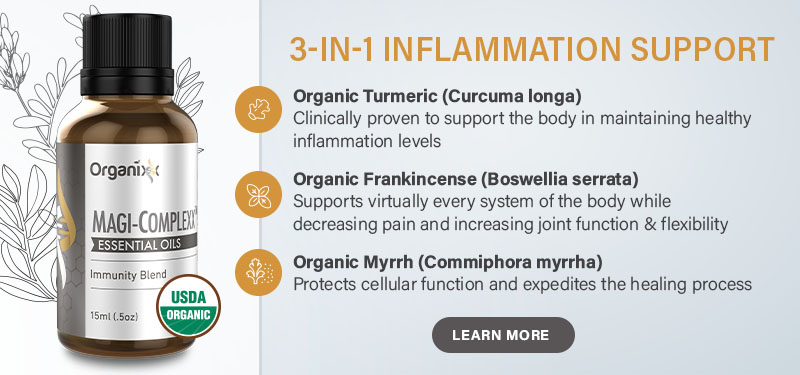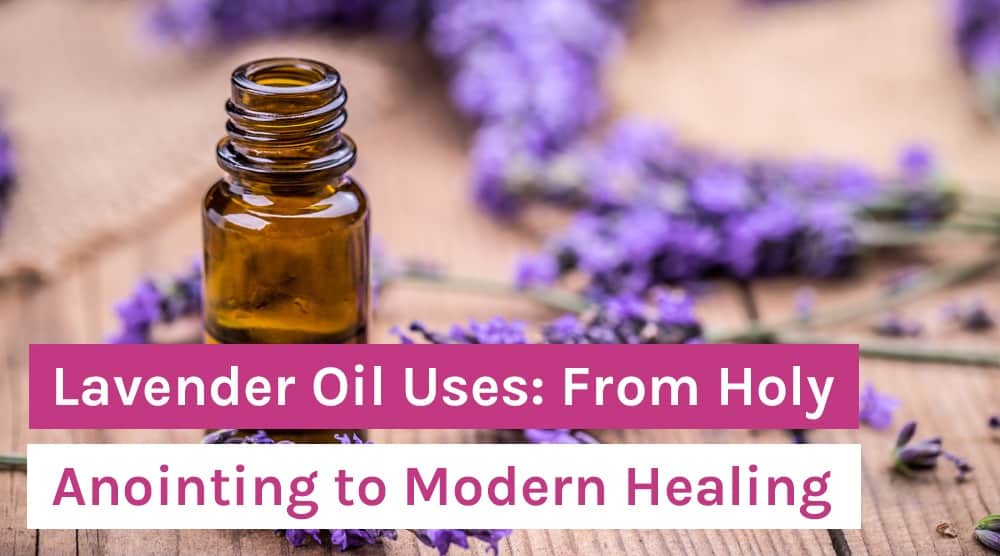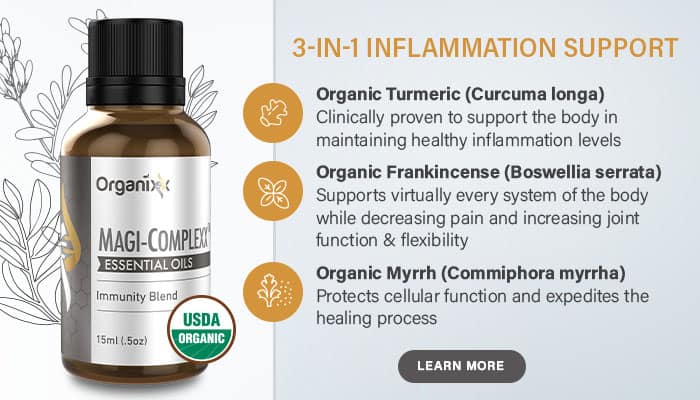Lavender Oil Uses: From Holy Anointing to Modern Healing
In a hurry? Click here to read the Article Summary...
The lavender plant is truly an amazing sight to see with its petite purple flowers that cap slender stalks jutting forth in every direction from its bushy center. But the dazzling display of beauty it bestows to its beholders is only the tip of the iceberg as to the true essence of this beloved botanical.
With a calming, sweet-smelling aroma and an extensive history of therapeutic lavender oil uses, it’s no wonder that lavender still ranks among the most popular medicinal herbs in the world.
For more than 2,500 years, in fact, people have been using lavender both medicinally and religiously to make everything from perfumes to holy anointing oils, to healing salves and ointments.
In ancient Egypt, lavender oil was commonly used to embalm the dead. In ancient Rome, it was used to freshen the air and scent bath water, as well as to liven up food. Many biblical scholars even suggest that Saint Mary used it to anoint Christ with her hair – lavender likely being the costly perfume referenced in John 12:3 as nard, or spikenard.
All throughout the ages, lavender has held a special place in the collective heart of mankind. It possesses an almost sacred nature, after all, being set apart from most other plants in terms of the many unique ways in which it interacts with the senses. Beyond just its pleasant bouquet, lavender is said to impact the body on many different levels – not only physically, but also emotionally and even spiritually.
The Harmonious Balancing Properties of Lavender Oil
 Your being isn’t just your physical body, after all. It’s also your mind and your soul. And if you examine the historical accounts, lavender seems to touch all three pieces of this complex human puzzle. It helps to quiet what goes on inside the head while balancing everything else.
Your being isn’t just your physical body, after all. It’s also your mind and your soul. And if you examine the historical accounts, lavender seems to touch all three pieces of this complex human puzzle. It helps to quiet what goes on inside the head while balancing everything else.
You might just say that lavender is powerfully holistic, with lavender oil being one of the most coveted distillates on the planet for imparting full-spectrum health support.
Lavender essential oil has been studied for its positive effects on a wide range of mood and sleep-related conditions including:
- Stress
- Anxiety
- Depression
- PTSD
- Insomnia
- Headaches
- Migraines
Lavender Essential Oil for Stress & Anxiety
The use of lavender essential oil to help mitigate feelings of stress and anxiety is well-established both empirically and scientifically. A paper published in the International Journal of Psychiatry in Clinical Practice found that individuals who took daily capsules filled with 80 milligrams of lavender essential oil experienced pronounced relief from these and many other symptoms, including depression.
Lavender has repeatedly been shown to help improve mood and sleep quality while causing no negative side effects [1].
The reported balancing effects of lavender oil extend even further, as demonstrated with another paper published in the journal Evidence-Based Complementary and Alternative Medicine suggesting powerful efficacy with regards to the nervous system.
In evaluating a cohort of both animal and human trials where it was thoroughly tested as a potential treatment, researchers from Europe and the Middle East concluded that lavender oil exhibits strong anxiolytic (anxiety-reducing), mood-stabilizing, sedative, analgesic, anti-convulsive, and neuroprotective properties ][2].
Many individuals who suffer from depression and anxiety symptoms find relief when using lavender oil as aromatherapy. High-risk postpartum women, one study found, tend to respond well to the use of lavender oil, which can help minimize or eliminate symptoms in as little as four weeks [3].
Can Lavender Assist with PTSD?
Lavender oil can provide similar benefits for people with post-traumatic stress disorder (PTSD), as evidenced in another study looking at its effects specifically on mood. Researchers found that taking just 80 mg of lavender oil per day resulted in a 32.7% reduction in depression symptoms, as well as dramatic improvements in both mood and sleep quality [4].
 Sleep Better with Lavender
Sleep Better with Lavender
The findings of a similar study published in the Journal of Alternative & Complementary Medicine support this as well, having found that individuals with insomnia slept 60% better when they started using lavender oil [5].
Lavender Can Help Soothe Headaches
Lavender oil is also incredibly soothing against headaches, according to another study published in the European Journal of Neurology – headaches, and especially migraines, being a common cause of sleep disruption for many people [6].
What’s in Lavender Essential Oil?
The primary active constituents in lavender oil, which include linalool, linalyl acetate, 1,8-cineole B-ocimene, terpinen-4-ol, and camphor, lend to all of this pronounced biological activity. These compounds vary in amount and ratio, of course, depending on the type of lavender oil used.
There happen to be more than 30 different species of lavender that we currently know of, with many dozen more subspecies and hundreds of hybrids and selected cultivars.
While all lavender may have benefits, the type of lavender that has been most researched and is regarded as the most therapeutic type of lavender is Lavandula angustifolia.
Lavender Essential Oil for Skin Support
Many of the lavender oil uses mentioned above tend to be aromatherapeutic in nature. But this precious substance can also be applied topically to support other areas of the body, not the least of which include the skin.
With pronounced antimicrobial properties that are highlighted in nearly 100 scientific studies, lavender oil is often used to help accelerate the healing of abrasions, burns, cuts, and other skin wounds.
This common way of using lavender oil is perhaps the biggest reason why essential oils in general are even on the natural medicine radar today. It was French chemist René-Maurice Gattefossé’s use of lavender oil back in 1928 to heal a burn on his hand that propelled the idea of using essential oils therapeutically into the modern age.
This event is believed to be the primary reason why essential oils are growing in popularity today.
Lavender Fights Bacteria & Viruses
With that in mind, consider that we now know from further scientific inquiry since the time of Gattefossé that lavender oil may also help to prevent infections stemming from bacteria, viruses, and fungi.
Especially when combined with other antimicrobial essential oils such as clove oil, cinnamon, and tea tree, studies show that lavender oil has the pronounced ability to combat even hard-to-fight infections such as Staphylococcus aureus and Candida albicans [7].
When mixed with a carrier oil such as coconut, olive, or jojoba, lavender oil can also help to soothe dry, chapped, or sunburned skin. Some people say that it also helps minimize the appearance of sunspots and aging. Lavender oil is also commonly used to help stop allergic reactions from occurring on the skin, such as those stemming from exposure to poison ivy or stinging nettle.
Better Than Vitamin C? The Antioxidant Power of Lavender Oil
Many people don’t know this, but lavender oil is also a powerful antioxidant. With an antioxidant potential that’s stronger than even vitamin C, lavender can be considered an antioxidant “super hero” and is actually one of the most powerful antioxidants in existence.
Lavender’s constituents help the body to produce more antioxidant enzymes like glutathione (aka the “master antioxidant”), catalase, and superoxide dismutase (SOD), which it needs to prevent free radicals from causing oxidative damage within its many complex parts.
In an animal study published in the journal Phytomedicine, Romanian  scientists discovered that vaporizing lavender oil for just one hour every day for seven days can help protect cells against free radical damage.
scientists discovered that vaporizing lavender oil for just one hour every day for seven days can help protect cells against free radical damage.
In this same rat study, researchers reported that inhaling the vapor of lavender oil every day for just 60 minutes helped to prevent the type of oxidative stress associated with Alzheimer’s disease and other forms of dementia [8].
Chinese researchers came to another fascinating conclusion in an unrelated but similar mouse study, determining that the antioxidant potential of lavender’s constituents are evident in the body after just 22 hours of the oil’s use [9].
There’s even animal research findings emerging to suggest that lavender oil could be beneficial in addressing the various blood sugar issues associated with diabetes [10].
Safely Using Lavender Oil to Support Your Health
The lavender oil uses shared with you here are just a few of the many ways this fragrant herb supports a balanced, healthy body. If you are not experienced with essential oils, your safest bet is to work with a qualified health practitioner to determine how best to use lavender oil to support your personal health goals.
It should go without saying that in order to receive the most health-boosting benefits, use only high quality organic essential oils that contain no chemicals or fillers.
The powerhouse trio of herbs in Magi-Complexx Essential Oil provides the strongest, most synergistic healing effect, helping sufferers of arthritis pain, constant muscle aches and pains, neuropathy, systemic inflammation, slowed wound healing, circulatory challenges, as well as skin irritations like eczema, psoriasis, and acne.

 Sources:
Sources:
Article Summary
For more than 2,500 years people have been using lavender both medicinally and religiously to make everything from perfumes to holy anointing oils, to healing salves and ointments.
Lavender essential oil has been studied for its positive effects on a wide range of mood and sleep-related conditions including:
- Stress
- Anxiety
- Depression
- PTSD
- Insomnia
- Headaches
- Migraines
Lavender has repeatedly been shown to help improve mood and sleep quality while causing no negative side effects.
Many individuals who suffer from depression and anxiety symptoms find relief when using lavender oil as aromatherapy.
A study published in the Journal of Alternative & Complementary Medicine shows that individuals with insomnia slept 60% better when they started using lavender oil.
Lavender oil is often used to help accelerate the healing of abrasions, burns, cuts, and other skin wounds.
Lavender is one of the most powerful antioxidants in existence.




is lavender oil harmful to cats?
How do I use the lavender oil to help me sleep. I’ ordered it and got it in the mail today. Do I rub a drop under my nose?
This information about lavender oil is fascinating.
I would like more. Thank you, Eve
Hi there,I check your blogs named "Lavender Oil Uses: From Holy Anointing to Modern Healing" daily.Your story-telling style is awesome, keep it up! And you can look our website about powerful love spells.
We are glad you enjoyed it. Thank you!
Where can I buy your Lavender Oil???
Kathleen,
Here is a link to the purchasing page for our lavender oil: http://bit.ly/2GYpIj2
Im confused, one time you said do not consume lavendar and in this article its says you eat lavendar capsules? Cant you just put it on your tongue with coconut oil? Is it safe to ingest it?
Hi Kim,
You can reach out to our customer support team for more information about this: https://support.organixx.com/
I wouldn't wait to long for a reply. I left a message 1 month ago - no reply.
Hi J Matthews,
If you can give us your ticket number or email address we can make sure that your message and issue gets taken care of. Also sometimes responses from our agents go to your spam/promotional folders. Please check there to see if someone has already responded to you.
I also reiterate this question. You say ''use'' lavender oil. I smudge it under my nose and on my temples.